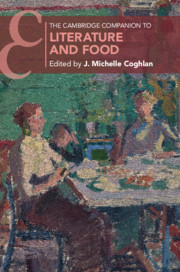Book contents
- The Cambridge Companion to Literature and Food
- The Cambridge Companion to Literature and Food
- Copyright page
- Contents
- Illustrations
- Contributors
- Acknowledgments
- Chronology of Major Works and Events
- Introduction: The Literature of Food
- 1 Medieval Feasts
- 2 The Art of Early Modern Cookery
- 3 The Romantic Revolution in Taste
- 4 The Matter of Early American Taste
- 5 The Culinary Landscape of Victorian Literature
- 6 Modernism and Gastronomy
- 7 Cold War Cooking
- 8 Farm Horror in the Twentieth Century
- 9 Queering the Cookbook
- 10 Guilty Pleasures in Children’s Literature
- 11 Postcolonial Tastes
- 12 Black Power in the Kitchen
- 13 Farmworker Activism
- 14 Digesting Asian America
- 15 Postcolonial Foodways in Contemporary African Literature
- 16 Blogging Food, Performing Gender
- Selected Guide to Further Reading
- Index
- Cambridge Companions to Literature
8 - Farm Horror in the Twentieth Century
Published online by Cambridge University Press: 17 March 2020
- The Cambridge Companion to Literature and Food
- The Cambridge Companion to Literature and Food
- Copyright page
- Contents
- Illustrations
- Contributors
- Acknowledgments
- Chronology of Major Works and Events
- Introduction: The Literature of Food
- 1 Medieval Feasts
- 2 The Art of Early Modern Cookery
- 3 The Romantic Revolution in Taste
- 4 The Matter of Early American Taste
- 5 The Culinary Landscape of Victorian Literature
- 6 Modernism and Gastronomy
- 7 Cold War Cooking
- 8 Farm Horror in the Twentieth Century
- 9 Queering the Cookbook
- 10 Guilty Pleasures in Children’s Literature
- 11 Postcolonial Tastes
- 12 Black Power in the Kitchen
- 13 Farmworker Activism
- 14 Digesting Asian America
- 15 Postcolonial Foodways in Contemporary African Literature
- 16 Blogging Food, Performing Gender
- Selected Guide to Further Reading
- Index
- Cambridge Companions to Literature
Summary
From the turn of the twentieth century forward, movie makers, fiction writers, and journalists have increasingly pushed into view bodies mangled by agricultural machinery, workers drowning in silos filled with grain, and lands laden with synthetic toxins. Farms have frequently appeared not only as ideal homesteads near picturesque villages but also as cogs in the brutality of corporate agribusiness, or as isolated and alien outposts struggling for economic survival in depopulated landscapes. The farm has even grown into a privileged setting for stories of supernatural horror bound to the rise of agriculture’s industrialization. Tangled with images of terror and mutilated bodies, Thomas Jefferson’s once idyllic “labor in the earth” now often takes place on a threatening, quasi-industrial, vast and lonely landscape of corn. Texts examined include Frank Norris' The Octopus, H.P. Lovecraft’s “The Picture in the House,” Truman Capote’s In Cold Blood and Stephen King’s “The Children of the Corn.”
Keywords
- Type
- Chapter
- Information
- The Cambridge Companion to Literature and Food , pp. 116 - 130Publisher: Cambridge University PressPrint publication year: 2020



